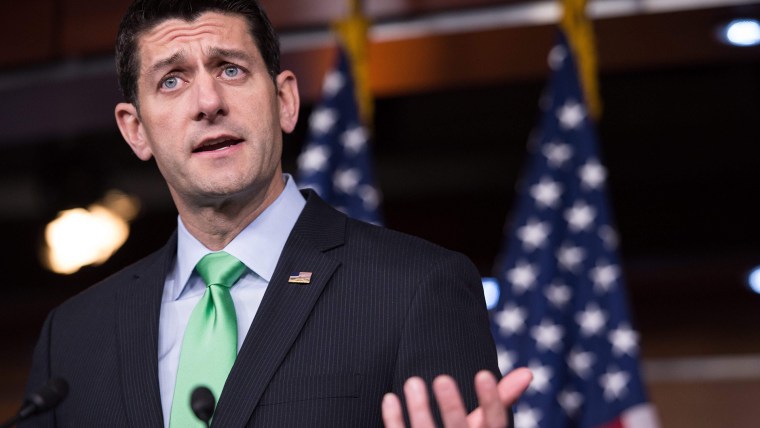Last week, House Speaker Paul Ryan (R-Wis.), desperate to maintain interest in Hillary Clinton's email protocols, came up with a new idea. The Republican leader
formally appealed to Director of National Intelligence James Clapper, urging him to prohibit Clinton from receiving intelligence briefings ahead of the election.
Republican House Speaker Paul Ryan's request to block Hillary Clinton from receiving classified intelligence briefings was denied by Director of National Intelligence James Clapper on Monday. In a letter to Ryan, Clapper wrote that he did "not intend to withhold briefings from any officially nominated, eligible candidate."
A spokesperson for Speaker Ryan said he and his staff "obviously disagree with the decision." Perhaps, though it's hard to imagine they really care as much as they're pretending to. Ryan may yet move
on legislation to restrict Clinton's access to sensitive information, though it'll never become law, and it'll have to wait until after Congress returns from its lengthy summer break.
Regardless, Ryan's anti-Clinton scheme didn't pan out. Maybe the Republican perjury gambit will be more successful? The
Washington Post reported late yesterday:
Two Republican congressmen on Monday formally requested that the U.S. Attorney for the District investigate whether Hillary Clinton committed perjury when she testified before a congressional committee about her use of a private email server while she was secretary of state. The letter from U.S. Reps. Jason Chaffetz (R-Utah) and Bob Goodlatte (R-Va.) asserts that evidence collected by the FBI during its investigation involving Clinton's email practices "appears to directly contradict several aspects of her sworn testimony" and asks federal authorities to "investigate and determine whether to prosecute Secretary Clinton for violating statutes that prohibit perjury and false statements to Congress, or any other relevant statutes." It is addressed to U.S. Attorney Channing D. Phillips and copied to FBI Director James B. Comey and U.S. Attorney General Loretta Lynch.
We talked a bit yesterday about
how foolish this is, but let's be a little more specific about the controversy's merits.
When Clinton testified before the Republicans' Benghazi Committee -- yet another partisan crusade that failed -- she told lawmakers that there was "nothing marked classified on my emails." Out of more than 30,000 emails, however, FBI found three with a "C" notation, for "classified."
This, according to Republicans, is proof of perjury. It's not. Two of the three emails were incorrectly marked with a "C," and FBI Director James Comey has already explained to Congress that all three of the emails failed to include the normal headers for classified information.
As
Mother Jones' Kevin Drum
explained, "At most, then, we have the bare possibility that out of four years worth of emails, Clinton might -- maybe -- have failed to notice a proper classification mark on
one of them. Why? Because it didn't include the proper header to warn readers that classified information was somewhere in the body of the email. This is what Republicans want the FBI to spend time investigating."
Perjury is incredibly hard to prove anyway, and this "controversy" is little more than a mirage.
